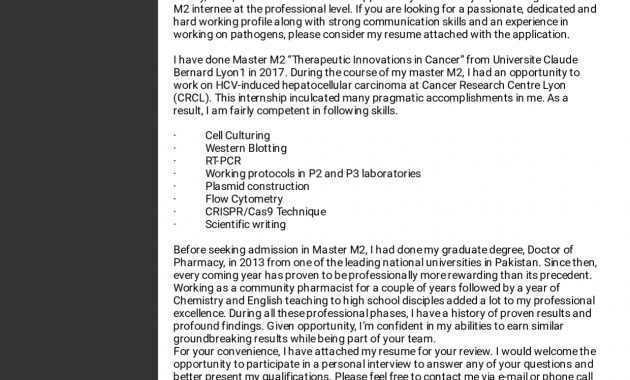Cover Letter for Ph.D. Applications: Crafting an Impressive Introduction
Cover Letter For Ph.D. Applications – In the competitive world of academia, where brilliant minds converge to pursue groundbreaking research and knowledge, a well-crafted cover letter can make all the difference when applying for a Ph.D. program. This article will guide you through writing a compelling cover letter for your Ph.D. applications, helping you stand out from the sea of applicants and capturing admissions committees’ attention. By following these expert tips and strategies, you can showcase your passion, qualifications, and suitability for the program, increasing your chances of acceptance.
Understanding the Purpose of a Cover Letter for Ph.D. Applications
Before delving into the intricacies of writing an effective cover letter, let’s first understand its purpose and significance. A cover letter serves as your introduction to the admissions committee, allowing you to go beyond the factual details in your application and convey your motivation, research interests, and academic potential. It acts as a personal statement, enabling you to demonstrate why you are an ideal candidate for the program and how it aligns with your long-term academic and career goals.
To make your cover letter impactful, emphasize the qualities that make you unique and relevant to the program. Highlight your research experience, academic achievements, and any additional skills or expertise pertinent to the field of study. Remember, the cover letter is an opportunity to showcase your passion, dedication, and suitability for the Ph.D. program.
How to Write an Effective Cover Letter for Ph.D. Applications
- Research the Institution: Before you begin writing, conduct thorough research on the institution you are applying to. Familiarize yourself with the faculty, their research interests, and the program’s focus areas. This knowledge will enable you to tailor your cover letter, aligning your aspirations and research goals with the institution’s objectives.
- Inclusion of Details: A well-crafted cover letter should provide essential details about your academic background, research experience, and publications. Briefly mention your undergraduate and postgraduate studies, emphasizing any relevant coursework, research projects, or academic achievements. Remember to connect your experiences to the program you are applying for, demonstrating how they have shaped your research interests and intellectual pursuits.
- Elements of an Effective Cover Letter: To ensure your cover letter captures the admissions committee’s attention, it should possess certain key features. Start with a captivating opening paragraph that grabs the reader’s attention and clearly states your intent. Use the body paragraphs to showcase your research experience, relevant skills, and academic achievements. Highlight your passion for the field and your dedication to advancing knowledge. Finally, conclude with a strong closing paragraph summarizing your key points and expressing your enthusiasm for joining the program.
- Format and Structure: Adhering to a standard format and structure is crucial for an effective cover letter. Begin with a professional salutation, addressing the appropriate person or committee. Use clear and concise paragraphs, making your writing easy to read and understand. Maintain a formal tone throughout the letter while injecting your personality and passion. End the letter with a polite closing and your contact information.
Tips for Writing a Compelling Cover Letter
- Establishing Academic Record: When crafting your cover letter, emphasize your academic record, including relevant coursework, thesis projects, and research publications. Discuss any honors, awards, or scholarships you have received, highlighting your exceptional performance and dedication to your field.
- Highlighting Strengths: Use your cover letter to showcase your strengths and unique qualities. Identify the key skills and attributes that make you an exceptional candidate. Whether it’s critical thinking, problem-solving, or collaboration, highlight these strengths and provide examples of how you have applied them in your academic journey.
- Clear and Concise Language: Admissions committees receive numerous applications, so it’s essential to communicate your ideas clearly and concisely. Avoid excessive jargon or technical language that may confuse the reader. Instead, focus on straightforwardly presenting your thoughts, allowing your passion and expertise to shine through.
- Outlining Relevant Experience: If you have prior research experience or have worked on projects related to your intended field of study, summarize these experiences in your cover letter. Demonstrate how they have contributed to your academic growth and shaped your research interests. This will help establish your credibility and prove your commitment to the field.
Common Mistakes to Avoid
In pursuing perfection, it’s essential to avoid common mistakes that can undermine the impact of your cover letter. Here are a few pitfalls to steer clear of:
- Grammatical and Spelling Errors: Proofread your cover letter meticulously to ensure it is free from grammatical or spelling mistakes. Errors can distract the reader and create a negative impression.
- Generic and Impersonal Content: Tailor your cover letter to each specific institution. Avoid using generic templates or content that lacks personalization. Take the time to understand the institution’s values, research areas, and faculty members, and showcase this knowledge in your letter.
- Excessive Length: Keep your cover letter concise and to the point. Admissions committees appreciate well-organized, focused letters conveying the necessary information without jargon.
- Lack of Enthusiasm: Inject your cover letter with genuine enthusiasm for the program and your intended field of study. Let your passion and drive shine through your writing, demonstrating your commitment to academic excellence.
Conclusion
Crafting an impressive cover letter is an art that requires meticulous attention to detail, thoughtful research, and skillful writing. By following the strategies outlined in this article, you will be well on your way to writing a compelling cover letter for your Ph.D. applications. Remember to showcase your academic achievements, highlight your strengths, and demonstrate your enthusiasm for the program. With a well-structured and persuasive cover letter, you will undoubtedly leave a lasting impression on the admissions committee, increasing your chances of acceptance into the esteemed Ph.D. program you aspire to join.
